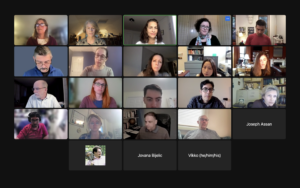The final report on this project is now available. Download the PDF.
As universities have become more linguistically diverse in recent years, questions are starting to be raised about language discrimination on campus and the existence of problematic language ideologies, that is, unspoken and sometimes unrecognized assumptions around languages and language use. Such ideologies impact every level of higher education, from policies for admission, to curriculum and instruction, to academic supports and resources. Yet language is an aspect of diversity, equity and inclusion that is mostly absent from institutional policies seeking to promote these values, including policies at Brandeis University. Indeed, the observation made by American sociolinguist Rosina Lippi-Green in 1994 remains largely true today – that linguistic profiling is “so commonly accepted, so widely perceived as appropriate, that it must be seen as the last widely open backdoor to discrimination.”
Over 2021-22, a team of six undergraduate and graduate students explored how international students at Brandeis use the linguistic resources at their disposal and respond to language challenges and opportunities in both their academic and social lives.
The project aimed to shed light on how Brandeis’ international students use all the linguistic resources at their disposal and respond to language challenges and opportunities, in both their academic and social lives, in a space that is predominantly English-speaking. This group constitutes an important component of the Brandeis population. In Fall 2020, 20% of Brandeis undergraduates and 33% of graduate students were international, with China being the first source country in both categories. Various other Asian countries were among the top 10 source countries.
“Multilingual Life on a Monolingual Campus” (MLMC) was enhanced by running in parallel with similar studies at Macquarie University in Sydney, Australia, and the University of Birmingham in the UK, both of which, like Brandeis, are English-dominant spaces with large international student populations. The LCJ Hub acted as the coordinator of this multi-country study. The Brandeis student research team interacted online with the other teams, shared ideas for the survey design and the subsequent interview process, and compared their findings.

Caption: Students from Brandeis, Macquarie and Birmingham Universities discuss their respective campus projects over Zoom. Meet the Brandeis researchers.
Given the recent increase in anti-Asian sentiment, an unfortunate and misguided response to the COVID pandemic, the Hub believed it was an opportune moment for institutions of higher education to turn their attention to how students hailing from other countries, and in particular Chinese students, navigate their multilingual lives on largely monolingual campuses.
Swigart noted, “It is important that we understand the challenges that international students face and how the pandemic, in particular, affects how they choose to communicate in public.” Macquarie-based scholar Agnes Bodis, who conducted doctoral research on the discursive construction of international students’ language proficiency in Australia, said of the joint project, “Understanding the lived experiences of international students is essential for the creation of a truly inclusive higher education.”
University of Birmingham’s Prof. Karen McAuliffe added, “This is a unique opportunity for students to work on a truly interdisciplinary and international project, which will shine a light on the experiences of international students across three continents.”
Read the findings from the Brandeis campus in the final report.
Want to learn about some of the ideas underlying this project? Review a list of relevant resources.
Read about the Macquarie University project.
